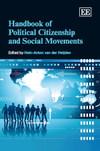Edward Ashbee has published a chapter in Heijden (ed): Handbook of Political Citizenship and Social Movements
The Tea Party Movement
This Handbook uniquely collates the results of several decades of academic research in these two important fields. The expert contributions successively address the different forms of political citizenship and current approaches and recent developments in social movement studies. Salient social movements in recent history are explored in depth, covering the environmental, women’s, international human rights, urban, Tea Party, and animal rights movements. Social movements and political citizenship in the ‘global South’: China, India, Africa, and the Arab World, are discussed, presenting a novel empirical insight into these fields of study.
The Tea Party movement emerged shortly after President Obama’s inauguration at the beginning of 2009. It drew upon depictions of a bloated governing elite as well as representations of a popular uprising and a citizenry reclaiming its natural rights. Although there have been different claims about the movement’s embrace of the term ‘tea party’, it is usually understood as an allusion to the Boston Tea Party of 1773, so often celebrated as the beginning of the American colonies’ rebellion against tyrannical government. Almost at once the movement galvanized sections of the right that had been dispirited by both the 2008 elections and what some saw as the fiscal recklessness of the Bush years. The two-party system and the relative porousness of those parties enabled it to leverage the Republican Party in a way that would not be possible in many other political systems. The movement drew together those who had backed Alaskan Governor Sarah Palin’s vice-presidential campaign, libertarians as well as independent conservatives who were at some distance from the Republican Party ‘establishment’. As it began to take a more structured form and movement organizations such as the Tea Party Express emerged, the movement seemed to have either displaced or absorbed the ‘religious right’ that had been a core Republican constituency from the late 1970s onwards. The movement also had wider impacts.
Edward Ashbee: “The Tea Party Movement” pp. 493-517 in Hein-Anton van der Heijden (ed): Handbook of Political Citizenship and Social Movements, 712pp, ISBN 9781781954690, November 2014.
